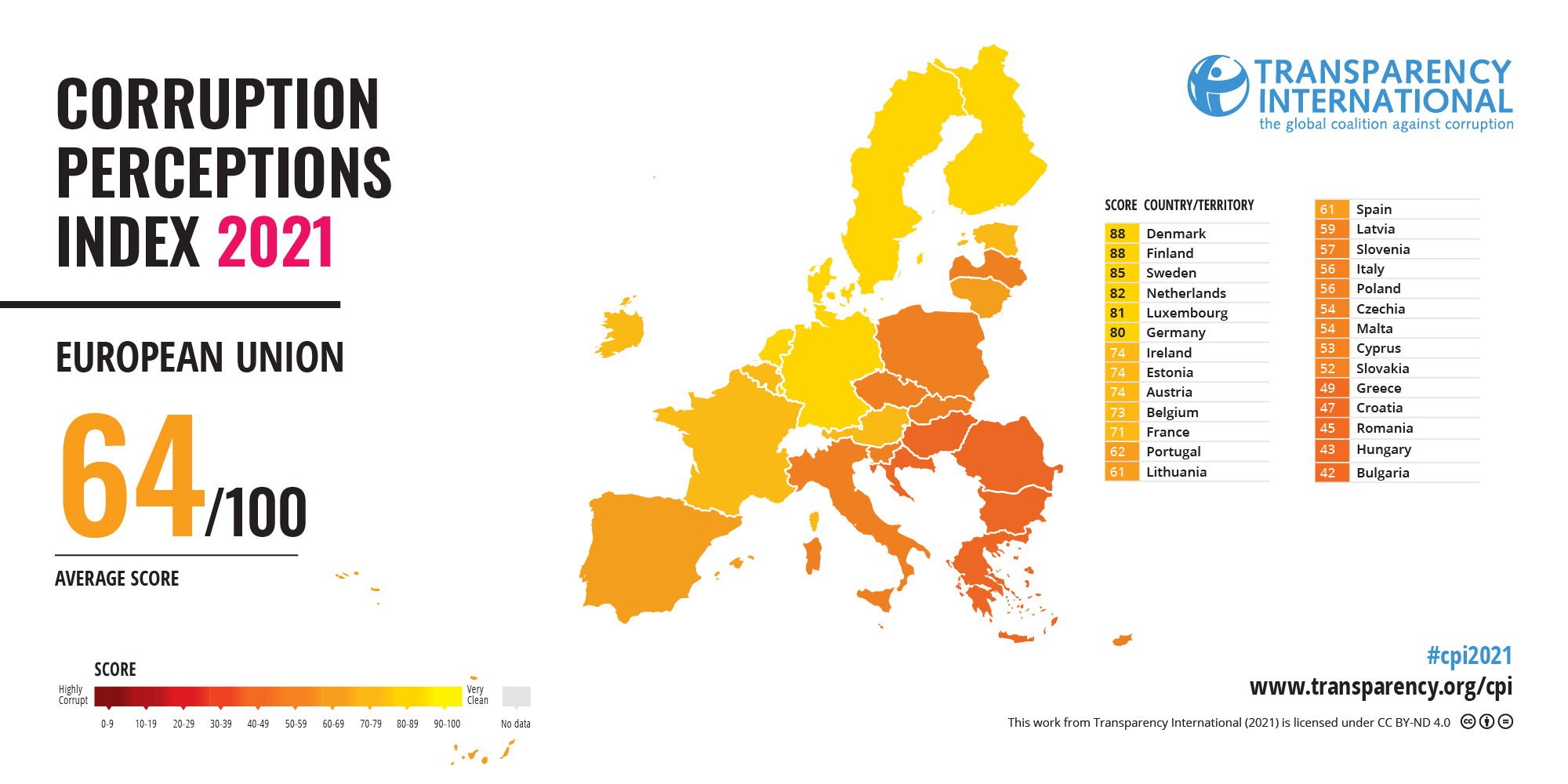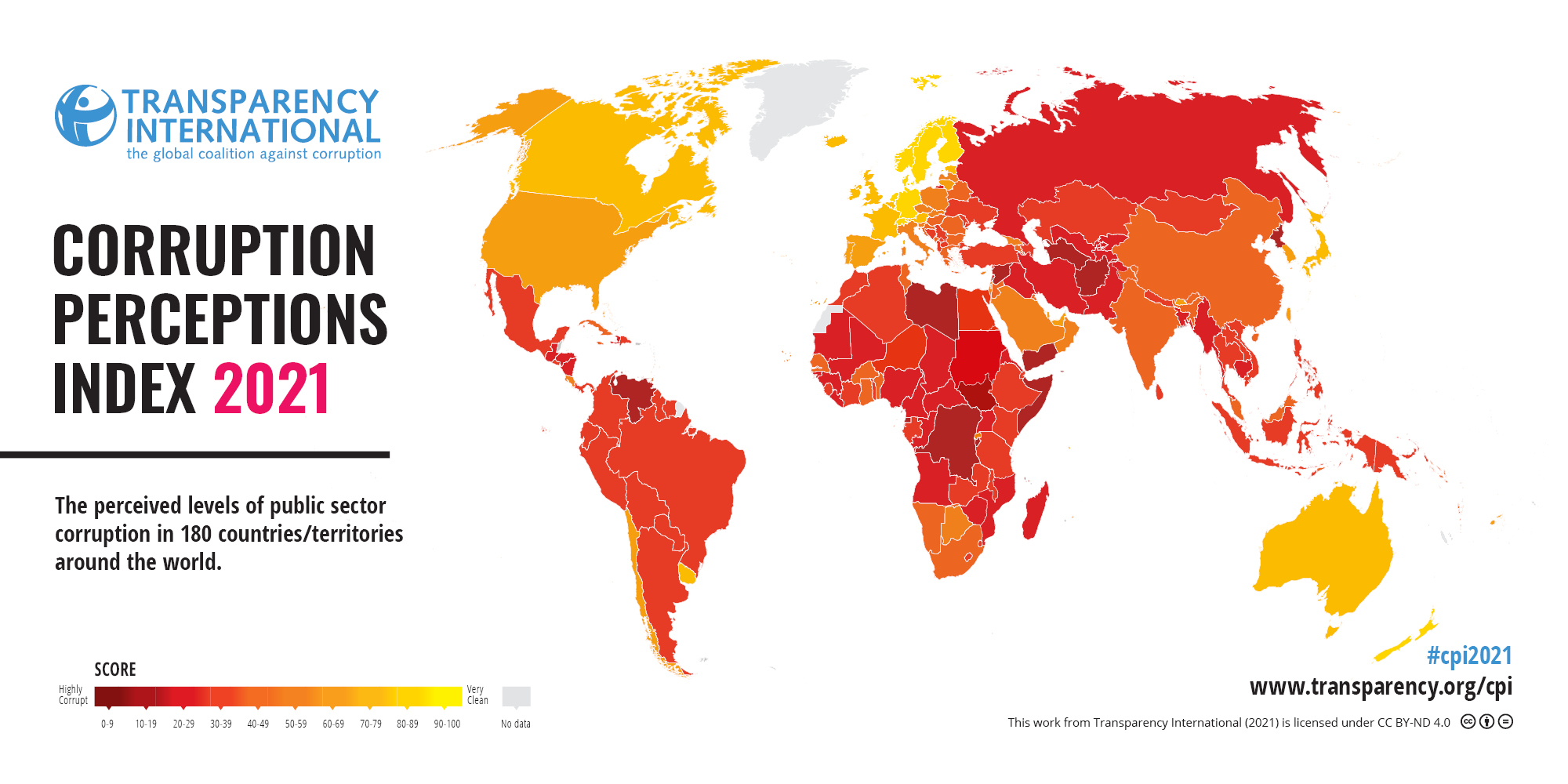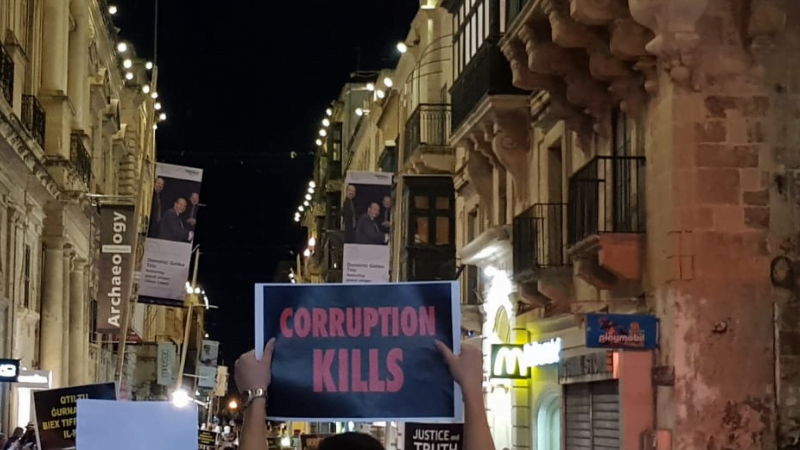There has been no significant progress in Malta’s ranking in Transparency International’s annual Corruption Perceptions Index (CPI) published today, with the country moving up just one place from 53 to 54 out of a total score of 100.
Malta’s score coincides with the overall assessment of this year’s report that reveals how corruption levels have stagnated worldwide and that despite commitments on paper, 131 countries have made no significant progress against corruption over the last decade.
The index ranks 180 countries and territories by their perceived levels of public sector corruption according to 13 expert assessments. On the scale, 100 is very clean and 0 is highly corrupt. Malta was a significant decliner on the index, dropping seven points since 2015 and hitting an all-time low in 2020.
Best and worst scores in Western Europe and the European Union
The latest report describes how, in Western Europe and the European Union, 84% of countries have declined or made little to no progress in the last 10 years.
Denmark (88) and Finland (88) top the region (and the world alongside New Zealand), with Norway (85) and Sweden (85) rounding out the top, while Romania (45), Hungary (43) and Bulgaria (42) remain the worst performers in the region.
This year, Switzerland (84), Netherlands (82), Belgium (73), Slovenia (57), Poland (56), Cyprus (53), and Hungary (43) are all at historic lows on the index.
Over the last 10 years, 26 countries in the region have either declined or made little to no significant progress. Since 2012, Luxembourg (81), Poland (56), Cyprus (53) and Hungary (43) have significantly declined on the CPI, while Austria (74), Estonia (74), Latvia (59), Italy (56) and Greece (49) have all improved their scores.

Corruption Perceptions Index scores for countries in the European Union.
Malta’s minimal move
Commenting on Malta’s latest standing in the index, the Daphne Caruana Galizia Foundation, which is Transparency International’s official contact point for Malta, told The Shift: “Malta scored 54 on the 2021 CPI, which is a marginal shift from the previous year’s index. However, celebration is premature. Malta is not among the bottom scorers, but we’re not among the top-scoring States in the EU, or even globally. A change in 1 or 2 points in the score often happens from year to year and can be due to a change in a single data source (the CPI uses 13 different data sources).”
The Foundation pointed out that “it’s large changes that last for two consecutive years or more that reliably indicate an improving situation. In a context that is known to be corrupt, a score that remains the same or shifts only minimally indicates that not enough is being done to stamp out corruption. We need to remember that Malta remains on FATF’s grey list, and we have yet to see anyone prosecuted for high level corruption.”
The COVID-19 pandemic and the Pandora Papers
Transparency International reports how, across Europe, governments are using the COVID-19 pandemic to expand executive powers, skip accountability measures and, in some cases, curtail fundamental rights.
Countries like Poland and Hungary continue to backslide, with harsh crackdowns on rights, freedom of expression and threats to independent media. Furthermore, even high-scoring countries like Germany (80), the United Kingdom (78) and Austria (74) have recently faced serious corruption scandals.
The latest Pandora Papers investigations also demonstrated how human rights abusers and other corrupt actors utilise weak systems in supposedly clean democracies to move wealth and further fund corruption and human rights abuses abroad.
The report notes how even in some of the highest-ranking countries globally – including Denmark, Sweden, Switzerland and the Netherlands – “banks operate with impunity as EU Member States drag their feet in implementing anti-money laundering legislation”.
Flora Cresswell, Western Europe regional coordinator of Transparency International said: “Stagnation spells trouble across Europe. Even the region’s best performers are falling prey to major scandals, revealing the danger of inaction. Others have allowed corruption to fester and are now seeing serious violations of freedoms. Nor does the region exist in a vacuum: lack of national enforcement in Europe means corruption is exported globally as foreign actors utilise weak laws to hide money and fund corruption back home.”

The Corruption Perceptions Index 2021
Corruption and human rights abuses
Transparency International’s report also established that those countries that violate civil liberties consistently score lower on the CPI.
Of the 23 countries where CPI scores significantly declined since 2012, 19 also declined on the civil liberties score. Additionally, out of the 331 recorded cases of murdered human rights defenders in 2020, 98% occurred in countries that have a CPI score below 45.
Addressing this link between corruption and human rights abuses, the Daphne Caruana Galizia Foundation said: “Unchecked corruption is a vicious circle. It enables abuses of human rights and democratic decline, which, in turn, lead to higher levels of corruption. This undermines a State’s ability to respect, protect, and fulfil its obligations to protect rights: freedom of expression, freedom of association, access to justice and the right to participate in public affairs”.
The Foundation stressed that the erosion of rights undermines the fight against corruption. “Pressure on the right to free speech, free assembly, free participation, and so on – whether this impacts activism, journalism or other ‘public watchdog’ functions – limits the ability of groups to demand accountability and clears the way for abuse of power. Typically, abusers are able to loot a country’s wealth, reward cronies and evade accountability.”
Restricting free expression, association, and assembly are popular tactics to weaken societal checks on corruption, which perpetuates corrupt networks and practices, the Foundation added.
Transparency International’s latest report can be found here.












